Advantages and Disadvantages of Outsourcing - …
有利之处和弊端英文作文
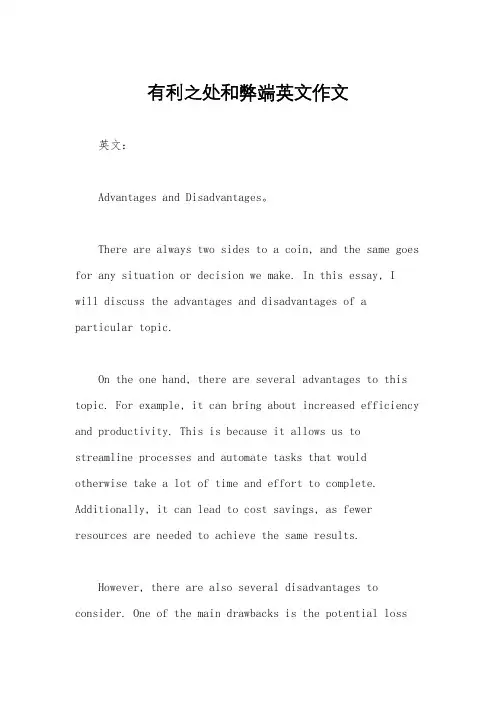
有利之处和弊端英文作文英文:Advantages and Disadvantages。
There are always two sides to a coin, and the same goes for any situation or decision we make. In this essay, Iwill discuss the advantages and disadvantages of a particular topic.On the one hand, there are several advantages to this topic. For example, it can bring about increased efficiency and productivity. This is because it allows us to streamline processes and automate tasks that would otherwise take a lot of time and effort to complete. Additionally, it can lead to cost savings, as fewer resources are needed to achieve the same results.However, there are also several disadvantages to consider. One of the main drawbacks is the potential lossof jobs. As tasks become automated, there may be less need for human workers, which can lead to unemployment and economic hardship. Another disadvantage is the potentialfor errors or glitches in the system. While automation can reduce the likelihood of human error, it is not foolproof and can still result in costly mistakes.Overall, it is important to weigh both the advantages and disadvantages of any decision or situation. While there may be benefits to be gained, there are also risks and drawbacks to consider.中文:利弊分析。
出国的优势和劣势英语作文al
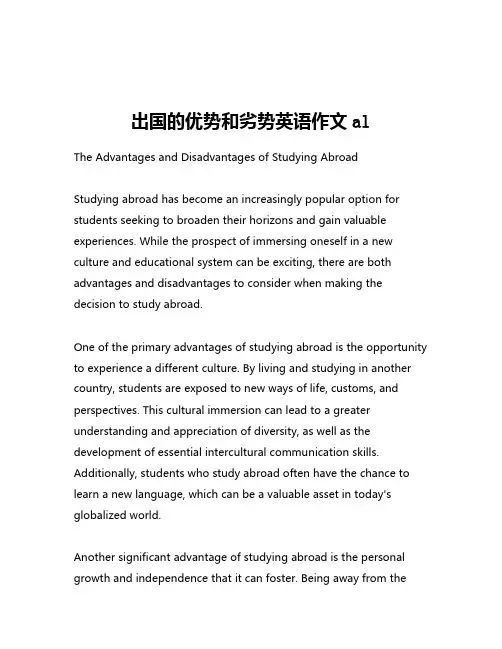
出国的优势和劣势英语作文alThe Advantages and Disadvantages of Studying AbroadStudying abroad has become an increasingly popular option for students seeking to broaden their horizons and gain valuable experiences. While the prospect of immersing oneself in a new culture and educational system can be exciting, there are both advantages and disadvantages to consider when making the decision to study abroad.One of the primary advantages of studying abroad is the opportunity to experience a different culture. By living and studying in another country, students are exposed to new ways of life, customs, and perspectives. This cultural immersion can lead to a greater understanding and appreciation of diversity, as well as the development of essential intercultural communication skills. Additionally, students who study abroad often have the chance to learn a new language, which can be a valuable asset in today's globalized world.Another significant advantage of studying abroad is the personal growth and independence that it can foster. Being away from thefamiliar surroundings of home can challenge students to become more self-reliant and adaptable. They must navigate unfamiliar environments, solve problems, and make decisions on their own, which can lead to increased confidence, problem-solving skills, and self-awareness. This personal development can be particularly beneficial for students who are transitioning from high school to college or university.Furthermore, studying abroad can provide students with unique educational opportunities that may not be available in their home countries. They may have the chance to take courses or participate in programs that are not offered at their home institutions, or to work with professors and experts who specialize in different fields. This exposure to diverse educational experiences can broaden students' intellectual horizons and deepen their understanding of their chosen areas of study.In addition, studying abroad can enhance a student's future career prospects. Employers often value the intercultural skills, adaptability, and global perspective that students develop through their international experiences. Furthermore, many study abroad programs offer internship or work-study opportunities, which can provide valuable practical experience and networking connections that can be beneficial for future job searches.However, there are also several disadvantages to consider when studying abroad. One of the primary challenges is the financial burden. Studying in another country can be significantly more expensive than studying at home, with costs such as tuition, housing, transportation, and living expenses adding up quickly. This can be a significant barrier for students from lower-income backgrounds, who may not have the financial resources to support an international education.Another potential disadvantage is the emotional and psychological toll that studying abroad can take on students. Being away from family, friends, and familiar surroundings can be isolating and lead to homesickness, culture shock, and other mental health challenges. Students may also face language barriers, which can make it difficult to communicate effectively and navigate daily life.Additionally, there may be logistical and administrative challenges associated with studying abroad, such as navigating complex visa and immigration requirements, adapting to different academic systems and expectations, and coordinating the transfer of academic credits. These practical hurdles can add significant stress and complexity to the study abroad experience.Finally, there is the risk of missing out on important events or opportunities in one's home country while studying abroad. Studentsmay feel disconnected from their local communities and may struggle to maintain relationships with friends and family back home. This can be particularly challenging for students who are studying abroad for an extended period of time.In conclusion, studying abroad can be a transformative and enriching experience, but it is not without its challenges. Students must carefully weigh the advantages and disadvantages of studying abroad and consider their personal, academic, and financial circumstances before making the decision to pursue an international education. Ultimately, the decision to study abroad should be based on a thorough assessment of one's goals, resources, and willingness to embrace the unique opportunities and obstacles that come with living and learning in a foreign country.。
有利之处和弊端英文作文
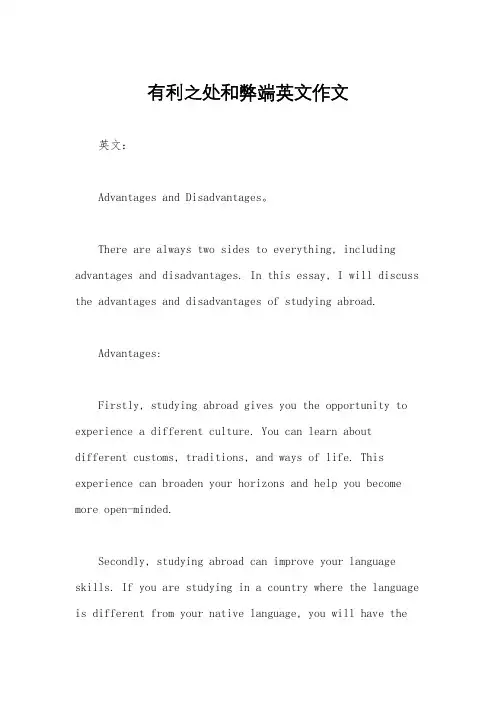
有利之处和弊端英文作文英文:Advantages and Disadvantages。
There are always two sides to everything, including advantages and disadvantages. In this essay, I will discuss the advantages and disadvantages of studying abroad.Advantages:Firstly, studying abroad gives you the opportunity to experience a different culture. You can learn about different customs, traditions, and ways of life. This experience can broaden your horizons and help you become more open-minded.Secondly, studying abroad can improve your language skills. If you are studying in a country where the language is different from your native language, you will have thechance to practice and improve your language skills.Thirdly, studying abroad can enhance your career prospects. Employers often value international experience, and studying abroad can demonstrate your ability to adaptto new environments and cultures.Disadvantages:Firstly, studying abroad can be expensive. Tuition fees, accommodation, and living expenses can be high. You mayalso need to pay for travel and insurance.Secondly, studying abroad can be lonely. You may be far away from your friends and family, and it can be difficultto make new friends in a new country.Thirdly, studying abroad can be challenging. You may face language barriers, cultural differences, and homesickness.In conclusion, studying abroad has both advantages anddisadvantages. It can broaden your horizons, improve your language skills, and enhance your career prospects. However, it can also be expensive, lonely, and challenging. It is important to weigh up the pros and cons before deciding whether to study abroad.中文:有利之处和弊端。
利弊的作文模板英文
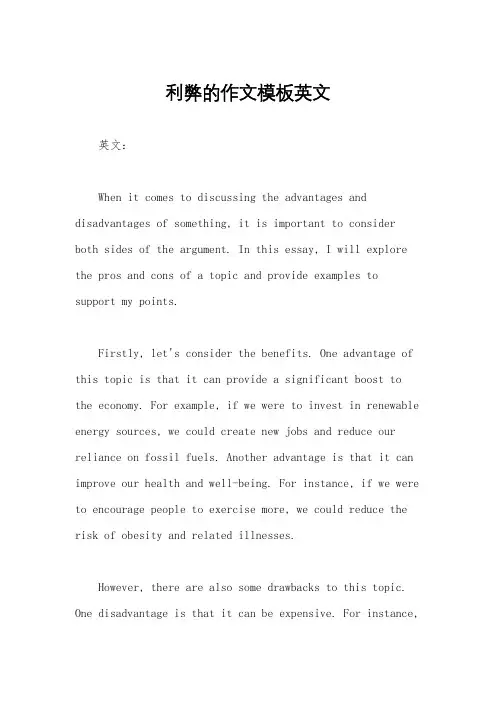
利弊的作文模板英文英文:When it comes to discussing the advantages and disadvantages of something, it is important to consider both sides of the argument. In this essay, I will explore the pros and cons of a topic and provide examples to support my points.Firstly, let's consider the benefits. One advantage of this topic is that it can provide a significant boost to the economy. For example, if we were to invest in renewable energy sources, we could create new jobs and reduce our reliance on fossil fuels. Another advantage is that it can improve our health and well-being. For instance, if we were to encourage people to exercise more, we could reduce the risk of obesity and related illnesses.However, there are also some drawbacks to this topic. One disadvantage is that it can be expensive. For instance,if we were to implement a new healthcare system, it would require a significant amount of funding. Another disadvantage is that it can be time-consuming. For example, if we were to introduce a new educational program, it would take time to develop and implement.In conclusion, there are both advantages and disadvantages to this topic. While it can providesignificant benefits, it can also come with its own set of challenges. It is important to carefully consider bothsides of the argument before making a decision.中文:当讨论某个事物的利弊时,考虑到双方的观点是很重要的。
英语四级利弊作文万能模板
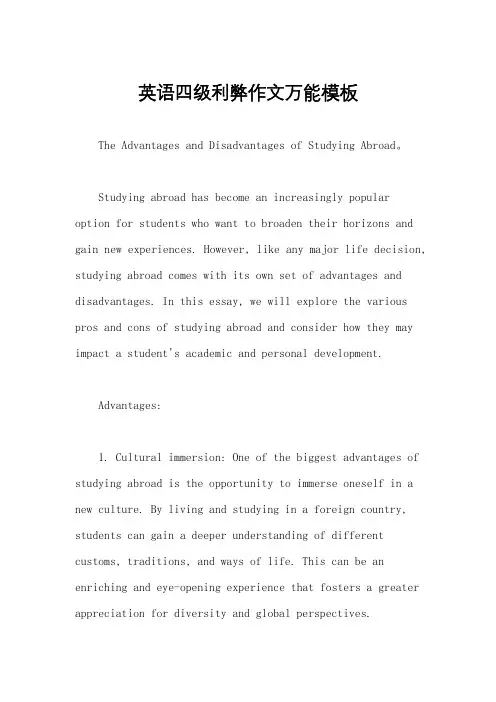
英语四级利弊作文万能模板The Advantages and Disadvantages of Studying Abroad。
Studying abroad has become an increasingly popularoption for students who want to broaden their horizons and gain new experiences. However, like any major life decision, studying abroad comes with its own set of advantages and disadvantages. In this essay, we will explore the various pros and cons of studying abroad and consider how they may impact a student's academic and personal development.Advantages:1. Cultural immersion: One of the biggest advantages of studying abroad is the opportunity to immerse oneself in a new culture. By living and studying in a foreign country, students can gain a deeper understanding of different customs, traditions, and ways of life. This can be an enriching and eye-opening experience that fosters a greater appreciation for diversity and global perspectives.2. Language acquisition: Studying abroad provides an excellent opportunity for students to improve their language skills. Being surrounded by native speakers and having to use the language in everyday situations can accelerate the learning process and help students become more fluent and confident in a foreign language.3. Personal growth: Living in a new country can be a transformative experience that challenges students to step out of their comfort zones and adapt to unfamiliar environments. This can lead to increased independence,self-reliance, and resilience, as well as a broader perspective on the world and one's own place in it.4. Academic opportunities: Many students choose to study abroad because of the unique academic opportunities available in their host country. Whether it's access to specialized courses, research opportunities, or renowned professors, studying abroad can offer a chance to expand one's academic horizons and gain valuable knowledge and skills that may not be available at home.Disadvantages:1. Homesickness: One of the most common challenges that students face when studying abroad is homesickness. Being far away from family and friends, and adjusting to a new culture and lifestyle, can be emotionally difficult and may impact a student's mental well-being and overall happiness.2. Financial burden: Studying abroad can be expensive, with costs including tuition, housing, travel, and living expenses. For many students, the financial burden of studying abroad may be a significant barrier, and they may need to rely on scholarships, loans, or family support to make it feasible.3. Language barrier: While studying abroad can be a great opportunity to improve language skills, it can also be a source of frustration and difficulty. Not being fluent in the local language can make everyday tasks and interactions more challenging, and may lead to feelings of isolation and frustration.4. Cultural adjustment: Adapting to a new culture and way of life can be a steep learning curve for many students. Differences in social norms, communication styles, anddaily routines can lead to misunderstandings and discomfort, and may require time and effort to navigate successfully.In conclusion, studying abroad offers a range of benefits, from cultural immersion and language acquisitionto personal growth and academic opportunities. However, it also comes with its own set of challenges, including homesickness, financial burden, language barriers, and cultural adjustment. Ultimately, the decision to study abroad should be carefully considered, weighing thepotential advantages and disadvantages to determine if itis the right choice for an individual student.。
大学英语作文The advantages and disadvantages of the studying abroad

The advantages and disadvantages of the studying abroad Nowadays, more and more people go to study abroad. Some people think it is bad, and some other people think it is good. In my opinion, we should go to study abroad.Firstly, with the development of the technology people need more knowledge in order to have a convenient and happy life. So we should acquire more useful knowledge by communicating with the foreign people. In particular, every country all have their own culture, for example, when we go to the united states, we can learn about modern intelligence. Then we can make our country strong. Moreover, they can really learn foreign language. However, the negative people think the costs are much higher than that in their own state. What's more, since it's too far away and they aren't familiar with the environment so that they feel very lonely.In all, different people have different ideals. In my opinion, I am in favor of studying abroad. In particular, it is advisable to attend schools abroad. And we can broaden our views. The most important, our government and the domestic enterprises are willing to provide favorable treatments to attract them to come back.。
关于利弊的英文作文
关于利弊的英文作文英文:When it comes to discussing the advantages and disadvantages of something, there are always two sides to consider. In my opinion, it is important to weigh both the pros and cons before making a decision.On the one hand, there are many benefits to consider. For example, if we look at the use of technology in education, we can see that it has revolutionized the way we learn. With online resources, students can access information from anywhere in the world, at any time. This has made education more accessible and convenient for many people.However, there are also some drawbacks to consider. For example, the overuse of technology can be detrimental to our health. We may spend too much time staring at screens, which can lead to eye strain, headaches, and other healthproblems. In addition, technology can be addictive, and we may find ourselves spending more time on our devices thanwe should.Overall, it is important to strike a balance betweenthe benefits and drawbacks of something. In the case of technology, we should use it as a tool to enhance our lives, but not let it take over completely.中文:谈到讨论一件事情的利弊,总是需要考虑两个方面。
利与弊的英文短语有哪些呢
利与弊的英文短语有哪些呢
在日常生活和学习工作中,我们经常会谈到某种决策或者行为的利弊。
在英语中,有很多表达这种含义的短语,下面将介绍一些常用的英文短语来讨论一件事情的利与弊。
表达“利”方面的短语
1.Pros and cons:这是最常用的表达之一,指的是事物的优点和缺点。
2.For the better:表示朝着更好的方向。
3.Silver lining:表示美好的一面,即在困难中发现的好的一面。
4.Advantages outweigh disadvantages:优势大于劣势。
5.Upside:积极的一面。
表达“弊”方面的短语
1.Drawbacks:指的是缺点或者坏的一面。
2.For the worse:朝着更糟糕的方向。
3.Downside:消极的一面。
4.Pitfalls:陷阱或者隐患。
5.Negative consequences:消极的后果。
总结
无论是在工作中还是在生活中,我们时常需要权衡利弊来做出决策。
掌握这些
表达利弊的英文短语,能够更准确地表达自己的观点,帮助我们更清晰地思考问题。
在与他人讨论事情利弊时,运用这些短语能够更有效地传达自己的想法。
希望以上介绍的短语能够帮助大家更好地表达利与弊的观点。
利弊英语作文模板句子
利弊英语作文模板句子英文回答:Advantages and Disadvantages of Outsourcing。
Outsourcing is the practice of hiring a third-party service provider to perform tasks or provide services that are traditionally handled internally by a company. This strategy has become increasingly popular in recent years as companies seek to reduce costs, improve efficiency, and gain access to specialized expertise.Advantages of Outsourcing:Cost Savings: Outsourcing often allows companies to save money on labor costs by moving operations to lower-cost countries or hiring contractors who can provide specialized services at a lower cost than in-house employees.Improved Efficiency: By outsourcing non-core tasks, companies can focus their internal resources on core competencies and streamline their operations, leading to improved efficiency and productivity.Access to Specialized Expertise: Outsourcing enables companies to tap into the expertise of specialized service providers who have deep knowledge and experience inspecific areas, such as IT, customer service, or manufacturing.Scalability: Outsourcing provides flexibility and scalability, allowing companies to adjust their workforce and services based on changing business needs without the need for expensive hiring and training processes.Innovation: Outsourcing partners can bring fresh perspectives and innovative ideas to a company, stimulating innovation and driving growth.Disadvantages of Outsourcing:Loss of Control: When outsourcing, companies cede some level of control over operations and decision-making to the external service provider, which can impact the company's ability to respond quickly to changes or ensure the quality of services.Security Risks: Outsourcing can increase security risks, as sensitive data and systems may be accessed by external parties. It is critical to implement robust security measures and establish clear protocols to mitigate these risks.Communication Challenges: Language and cultural differences can sometimes lead to communication challenges between the company and the outsourcing provider, which can hinder collaboration and coordination.Hidden Costs: While outsourcing can save money on labor costs, there may be hidden costs associated with managing the outsourcing relationship, such as contract administration, vendor management, and performance monitoring.Job Loss: Outsourcing can lead to job loss in certain industries or companies, as tasks are moved to external service providers. It is important to consider the potential impact on employees and communities when making outsourcing decisions.中文回答:外包的利与弊。
搜作业的利与弊英语作文
搜作业的利与弊英语作文The Advantages and Disadvantages of Searching for Homework。
In today's digital age, searching for homework online has become increasingly popular among students. It offers a wide range of benefits, such as easy access to information, convenience, and the ability to learn at one's own pace. However, there are also drawbacks to relying too heavily on online sources for homework. In this article, we will explore the advantages and disadvantages of searching for homework online.One of the major advantages of searching for homework online is the easy access to information. With just a few clicks, students can find a wealth of resources on any given topic. This allows them to gather a wide range of perspectives and information that can enrich their understanding of the subject matter. Online sources also provide up-to-date information, ensuring that students have access to the most current and relevant materials.Another advantage of searching for homework online is the convenience it offers. Students no longer have to spend hours in the library searching for books or articles. Instead, they can simply type in their query and instantly find a multitude of relevant sources. This saves time and allows students to focus on other important tasks or activities.Furthermore, searching for homework online allows students to learn at their own pace. Unlike traditional classroom settings where students must keep up with the teacher's pace, online resources provide the flexibility for students to review and study at their own speed. This personalized learning experience can be especially beneficial for students who may need additional time to grasp complex concepts or who learn better through self-paced learning.Despite the advantages, there are also disadvantages to relying too heavily on online sources for homework. One of the main drawbacks is the potential for misinformation. With the abundance of information available on the internet, it can be challenging for students to discern reliable sources from unreliable ones. This can lead to the inclusion ofinaccurate or biased information in their homework assignments, which can negatively impact their grades and overall understanding of the subject matter.Another disadvantage is the lack of critical thinking and analytical skills development. When students rely solely on online sources for their homework, they may miss out on the opportunity to engage in critical thinking and analysis. Traditional research methods, such as reading books and scholarly articles, often require students to evaluate and synthesize information from multiple sources. This process fosters critical thinking skills and the ability to form independent opinions. By solely relying on online sources, students may develop a passive approach to learning and miss out on the development of these important skills.In conclusion, searching for homework online offers numerous advantages, including easy access to information, convenience, and personalized learning. However, it is important for students to be wary of the potential drawbacks, such as misinformation and a lack of critical thinking skills development. By striking a balance between online and traditional research methods, students can make the most of the benefits while avoiding the pitfalls of relying solely on online sources for their homework.。
- 1、下载文档前请自行甄别文档内容的完整性,平台不提供额外的编辑、内容补充、找答案等附加服务。
- 2、"仅部分预览"的文档,不可在线预览部分如存在完整性等问题,可反馈申请退款(可完整预览的文档不适用该条件!)。
- 3、如文档侵犯您的权益,请联系客服反馈,我们会尽快为您处理(人工客服工作时间:9:00-18:30)。
Minimizing cost on IT infrastructure. IT consultants are fully trained on the latest
technologies. Service providers can offer more up-to-date
Advantages & Disadvantages of Outsourcing
author
Alberto Caramanica
Index
Introduction Core competencies Outsourcing Outsourcing the IT functions Examples of IT functions Advantages of Outsourcing Disadvantages of Outsourcing Conclusions
advanced technologies. No need to retain technically qualified in-
house personnel. Continuous IT support coverage without
having to rely on only one or two key people.
They are what gives an organization its clear leadership position as seen by its customers.
All remaining activities are non-core competencies.
4
Outsourcing
Is there a quicker, more effective method to handle IT issue?
these questions may help to decide to outsource or not the information technology functions.
6
Examples of IT functions
Managed network services. End user computing services. Applications development and maintenance
services. Service desk / Help desk. Cross functional equipment and software
satisfactory in the for every team-player of the service provider. Possible loss of flexibility in reacting to changing business conditions. Risk of fraud and confidentiality issues.
2
Introduction
To compete effectively, it is essential for business to concentrate on what they do best and where they can add value.
Organizations have switched emphasis to concentrate on their core competencies in order to increase market penetration and become more competitive.
3
Core competencies
Core competencies are the capabilities of an organization that truly distinguish it from its competitors.
They are unique capabilities upon which the success of the company depends.
Outsourcing involves the transfer of the responsibility for carrying out an activity to an external service provider.
Outsourcing covers a range of different types of functional areas (in terms of non-core competencies), including human resources management, product management, marketing management, and most commonly the management information systems.
5
Outsourcing the IT functions
Can the IT departments enhance our corporate financial goals?
Are the current IT resources capable of supporting new technology?
9
Conclusions
To go for outsourcing or not a company must make a comprehensive cost benefit analysis.
8
Disadvantages of Outsourcing
Hidden costs are difficult to calculate or prepare for.
Some degree of control is lost. Sometimes, communication skills are not
